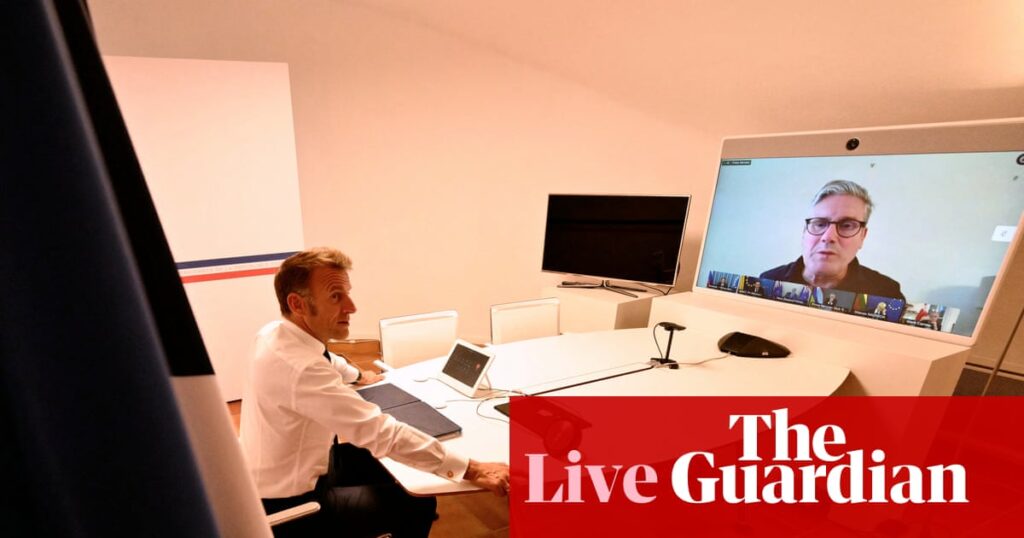Leaders to ‘discuss work on security guarantees’ and consider consequences of Russia’s ‘stubborn’ refusal to end war
We are getting a bit more detail on this Thursday’s meeting of the Coalition of the Willing, as confirmed by the Élysée Palace earlier (14:22).
The leaders will “discuss work on security guarantees for Ukraine carried out in recent weeks and take stock of the consequences to be drawn from Russia’s attitude, which stubbornly refuses peace,” the French presidency said in a statement quoted by the AFP.
The source said that the main topic of the Paris talks will be security guarantees for Ukraine and “promoting diplomacy, because the Russians are wriggling out again” of the efforts to end the war.
US president Donald Trump is not expected to take part in the gathering, the source added.
Separately, ministers from the ’coalition’ countries will on Wednesday discuss military support for Ukraine, a spokesperson for French armed forces minister Sébastien Lecornu said.
Key events
-
Spain’s PM announces plan to tackle climate crisis
-
Serbia’s Vučić also to meet Xi, Putin in Beijing after letter in Guardian on student protests
-
Slovak prime minister to meet China’s Xi, Russia’s Putin, Ukraine’s Zelenskyy this week
-
Berlin police investigate after Irish activist struck by officer at protest
-
Germany rejects von der Leyen’s comments on Ukraine troop deployment plans
-
Leaders to ‘discuss work on security guarantees’ and consider consequences of Russia’s ‘stubborn’ refusal to end war
-
Russia suspected of jamming GPS on plane carrying Ursula von der Leyen – full story
-
‘Coalition of the willing’ to meet on Thursday, Élysée confirms
-
No suggestion Russian Zapad military drills could lead to attack on Nato, Germany’s army chief says
-
‘There is a plan coming to shape,’ EU commission spokesperson insists on Ukrainian security guarantees
-
Europe ‘most affected region globally’ by GPS jamming, commission says
-
Von der Leyen’s plane affected by GPS jamming over weekend, commission confirms
-
Nato-Ukraine council to meet in Brussels today at Ukraine’s request
-
Von der Leyen’s plane hit by alleged Russian GPS interference in Bulgaria — report
-
Turkey working towards fair, lasting peace in Ukraine, Erdoğan tells Putin
-
‘Very dangerous’ situation shows need to strengthen border, defence, Lithuanian president says
-
EU’s von der Leyen stresses importance of bloc’s eastern border, outlines security guarantees for Ukraine
-
European capitals working on ‘pretty precise plans’ for deployment to Ukraine as part of security guarantees, EU’s von der Leyen says
-
Zelenskyy to meet European leaders in Paris on Thursday — source
-
Morning opening: Tick-tock
Spain’s PM announces plan to tackle climate crisis

Sam Jones
in Madrid
Spain’s prime minister, Pedro Sánchez, has announced a 10-point plan to prepare the country for the climate emergency, warning that “if we don’t want to bequeath our children a Spain that’s grey from fire and flames, or a Spain that’s brown from floods, then we need a Spain that’s greener”.
Sánchez said August’s heatwave-fuelled wildfires – which killed four people, burned through an area six times the size of Ibiza, and required “the biggest human and technical deployment” ever seen in Spain – showed immediate action must be taken to mitigate the effects of the climate crisis.
He said waiting any longer would be dangerous and expensive, and criticised those who deny the realities of global heating in Spain.
Over the past five years, he said, the climate emergency had caused more than 20,000 deaths and cost the public purse €32bn (£28bn) in material losses.
We need to mobilise as a society against climate change, which is a common enemy that lies beyond ideologies.
He added:
“Climate change kills. It kills.
And that’s why we have to be aware of everything it represents in terms of insecurity and in terms of the risks it poses to our lives. The climate change denial that’s coming from an important part [of society] – and which is growing as a result of the lies spread on social networks by some members of our political class – is as incomprehensible as it is worrying.”
He proposed a series of initiatives in Madrid on Monday, including a state civil protection agency to coordinate crisis responses, a network of climate refuges across the country and a rethink of forest management and land use. Only by acting now, he said, could the country hope to avert similar disasters or reduce their impacts.
Serbia’s Vučić also to meet Xi, Putin in Beijing after letter in Guardian on student protests
Embattled Serbian president Aleksandar Vučić will also attend the parade in Beijing and met with China’s Xi Jinping and Russia’s Vladimir Putin.
In May, he joined Fico in attending a Victory Day parade in Moscow, drawing criticism from the EU which argued it was not befitting an EU candidate country.
AFP noted that since Russia invaded Ukraine in February 2022, Serbia has refused to impose sanctions in contrast to the EU, despite its membership hopes.
Recently, Vučić sent a letter to the Guardian after our editorial argued that an authoritarian crackdown on mass demonstrations against alleged government corruption in an EU candidate country requires a stronger response from Brussels.
In his response, the Serbian president appeared to blame the student protest groups for violence, despite reports that it was often reportedly instigated by government supporters, and he more broadly sought to play down the demonstrations.
“What Serbia cannot accept is violence disguised as activism, undermining institutions that have been carefully built with dedication and the support of its European partners,” he said, accusing protesters of attempting to overthrow his government.
Judge for yourselves.
But let’s just say not everyone is entirely convinced by his explanations, as evidenced by this post by University of Belgrade professor, Filip Ejdus.
Slovak prime minister to meet China’s Xi, Russia’s Putin, Ukraine’s Zelenskyy this week
Slovak prime minister Robert Fico said in a Facebook post that he would will meet with Chinese president Xi Jinping, Russian president Vladimir Putin and Ukrainian president Volodymyr Zelenskyy in a series of high-level meetings this week.
Slovakia is the only EU country represented at a military parade in China marking 80 years since the end of the second world war, with Fico insisting he wanted to attend out of respect for all victims of the war.
In his 5-minute address, he also rejected the criticism for attending the event, remarking that we are seeing the emergence of a “new world order” and “new rules of the multipolar world, with new balance of powers.”
“To be a part of these discussions is to support dialogue,” he said.
The Slovak PM repeatedly faced criticism at home and abroad for maintaining close relations with Russia, including his visit to Moscow in December last year to meet with Vladimir Putin and in May to attend the Russian Victory Day parade.
He also repeatedly clashed with Ukraine over energy and attempted to delay EU sanctions on Moscow, and so this topic could come up during his meeting with Zelenskyy this week.
Berlin police investigate after Irish activist struck by officer at protest
Deborah Cole in Berlin and Rory Carroll in Dublin
Berlin police have opened an internal investigation after videos emerged showing an Irish activist at a pro-Palestinian demonstration being punched in the face twice by an officer, drawing protest from Ireland’s foreign office.
Footage posted on social media showed the activist, Kitty O’Brien, being struck by a policeman and dragged away, their face bloodied, from the rally on Thursday in the Mitte district of the German capital.
Local newspaper Der Tagesspiegel said O’Brien’s arm was also broken at the demonstration but this could not be independently verified.
A longer video published online shows a person resembling O’Brien, who uses non-binary pronouns, shouting insults including “fucking genocide supporter“ and “you’re acting like a fucking Nazi” at police. One of the officers then appears to strike them in the face two times. It is unclear from the footage whether the policeman intentionally targeted O’Brien’s face.
A Berlin police spokesperson confirmed that authorities were aware of the incident and said the officer had been identified.
“We as the Berlin police are reviewing whether the officer acted proportionately, and we’re doing it as part of a criminal investigation on suspicion of bodily harm on duty,” the spokesperson said.

Jakub Krupa
Let’s take a quick look at other events across Europe.
Germany rejects von der Leyen’s comments on Ukraine troop deployment plans
Germany’s defence minister on Monday harshly dismissed as premature remarks by European Commission President Ursula von der Leyen on plans to send European troops to Ukraine (10:24), saying she lacked the mandate to discuss the matter, Reuters reported.
“Those are things that you don’t discuss before you sit down at the negotiating table with many parties that have a say in the matter,” the minister, Boris Pistorius, told journalists during a visit to an ammunition factory in Cologne on Monday.
“I would know better than to comment or confirm such considerations in any way, apart from the fact that the European Union has no mandate or competency whatsoever when it comes to positioning troops,” he added.
Leaders to ‘discuss work on security guarantees’ and consider consequences of Russia’s ‘stubborn’ refusal to end war
We are getting a bit more detail on this Thursday’s meeting of the Coalition of the Willing, as confirmed by the Élysée Palace earlier (14:22).
The leaders will “discuss work on security guarantees for Ukraine carried out in recent weeks and take stock of the consequences to be drawn from Russia’s attitude, which stubbornly refuses peace,” the French presidency said in a statement quoted by the AFP.
The source said that the main topic of the Paris talks will be security guarantees for Ukraine and “promoting diplomacy, because the Russians are wriggling out again” of the efforts to end the war.
US president Donald Trump is not expected to take part in the gathering, the source added.
Separately, ministers from the ’coalition’ countries will on Wednesday discuss military support for Ukraine, a spokesperson for French armed forces minister Sébastien Lecornu said.
Lithuania’s former foreign minister Gabrielius Landsbergis does not seem to be particularly impressed by the pretty ‘meh’ reaction from the European Commission to the reported GPS jamming on plane carrying Ursula von der Leyen.
In a post on X, he said mockingly:
“Deeply concerned to hear about the deeply concerning GPS interference that diverted @vonderleyen‘s flight. Europe stands united in expression of deep concerns and must commit to the deployment of ever-deepening concerns moving forward.”
In responses to his post, he added:
“In order to address such concerns, another summit of the Coalition of the Concerned must be scheduled in the coming days and weeks.”
Russia suspected of jamming GPS on plane carrying Ursula von der Leyen – full story

Jennifer Rankin
in Brussels
and Oliver Holmes
Russia is believed to have jammed the satellite signal of a plane carrying the European Commission president, Ursula von der Leyen, over Bulgaria, reportedly forcing it to circle the airport for an hour.
Von der Leyen was travelling to Plovdiv on Sunday when her charter plane lost electronic navigation aids, delaying its arrival in the central Bulgarian city.
Interference with satellite navigation has become increasingly common in airspace near Russia and it remains unclear whether von der Leyen was deliberately targeted. Asked about this point, EU spokesperson said: “The question is best asked to the Russians.”
The incident happened during a four-day trip by von der Leyen to seven EU member states on the bloc’s eastern border. In Vilnius on Monday, von der Leyen did not mention the incident, but spoke of “constant military and hybrid threats” facing Lithuania.
In March 2024, Russia was believed to have been responsible for jamming the signal of a plane carrying the then UK defence secretary, Grant Shapps, who was returning to the UK from Poland. The RAF plane experienced GPS interference for about 30 minutes while it flew near the Russian exclave of Kaliningrad. It was reported at the time that it was unclear whether Shapps was the target.
GPS jamming and “spoofing” – an electronic warfare tactic that causes incorrect navigation information to be displayed – has increased since Russia’s full-scale invasion of Ukraine in 2022, and escalated even more sharply in the last year.
In June, 13 EU member states raised the alarm about jamming and spoofing threats disrupting air and sea travel. Poland recorded 2,732 cases of electronic interference in January 2025, up from 1,908 in October 2023, while Lithuania recorded 1,185, up from 556 in March 2024, according to an internal EU document drafted in May.
The document describes interference to global satellite navigation systems as “not random incidents but a systemic, deliberate action by Russia and Belarus”. It added that “causing significant damage has been simple and cheap” and was likely to continue without “proportional countermeasures”.
European Council president António Costa argued that the EU could not risk escalating tensions with the US over trade and tariffs at the same time as the bloc’s eastern borders remained under threat from Russia.
Speaking at the Bled Strategic Forum in Slovenia, he said it would be have been an imprudent risk to risk the relationship with the US.
That is why … we chose diplomacy over escalation. We gave space to dialogue, we chose restraint because we are responsible,” he said, as reported by Reuters.
‘Coalition of the willing’ to meet on Thursday, Élysée confirms
And we now have an official confirmation that the Coalition of the Willing will meet this Thursday to discuss what’s next on Ukraine war, as first reported by the AFP (10:05).
The meeting, co-chaired by France’s Emmanuel Macron and Britain’s Keir Starmer, will take place in a hybrid format and focus on security guarantees for Ukraine and a united response to Russia’s refusal to end the war, the Élysée Palace said.
Ukraine’s Volodymyr Zelenskyy is also expected to take part.
No suggestion Russian Zapad military drills could lead to attack on Nato, Germany’s army chief says
Germany does not expect Russian attacks on Nato territory under the cover of Moscow’s Zapad military drills which are set to kick off in two weeks, German chief of defence Carsten Breuer said, reported by Reuters.
“We don’t have any indication that preparations for an attack are taken under the cover of the exercise. But we will be on our guard, not just the German forces, but Nato,” Breuer told reporters in Berlin.
‘There is a plan coming to shape,’ EU commission spokesperson insists on Ukrainian security guarantees
The commission was also asked about von der Leyen’s FT interview on plans for Ukraine, with journalists doubting if the plans were as advanced as she made them sound (10:24).
Arianna Podestà said that commission representatives “participate in these technical level talks,” and von der Leyen remains in contact with other leaders.
“Therefore, it is the view of the president formed through the information that she gets in discussion with the leaders, as well as technical level engagements, that there is a plan that is coming to shape.
There is a clear roadmap, as she has said, towards building these security guarantees.
She has said that, for example, in last week’s meeting of the Coalition of the Willing and defence chiefs, they have worked out a pretty precise plan for this engagement.”

